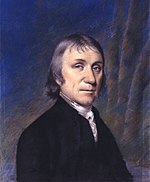
Joseph Priestley (13 March 1733 (old style) – 6 February 1804) was an 18th-century British theologian, Dissenting clergyman, natural philosopher, educator, and political theorist who published over 150 works. He is usually credited with the discovery of oxygen gas. Priestley was born to an established Dissenting family in West Yorkshire.
During his lifetime, Priestley's considerable scientific reputation rested on his invention of soda water, his writings on electricity, and his discovery of several "airs" (gases), the most famous being what Priestley dubbed "dephlogisticated air" (oxygen). However, Priestley's determination to reject what would become the chemical revolution and to cling to phlogiston theory eventually left him isolated within the scientific community.
Priestley's science was integral to his theology, and he consistently tried to fuse Enlightenment rationalism with Christian theism. In his metaphysical texts, Priestley attempted to combine theism, materialism, and determinism, a project that has been called "audacious and original". He believed that a proper understanding of the natural world would promote human progress and eventually bring about the Christian Millennium. Priestley, who strongly believed in the free and open exchange of ideas, advocated toleration and equal rights for religious Dissenters, which also led him to help found Unitarianism. (read more . . . )